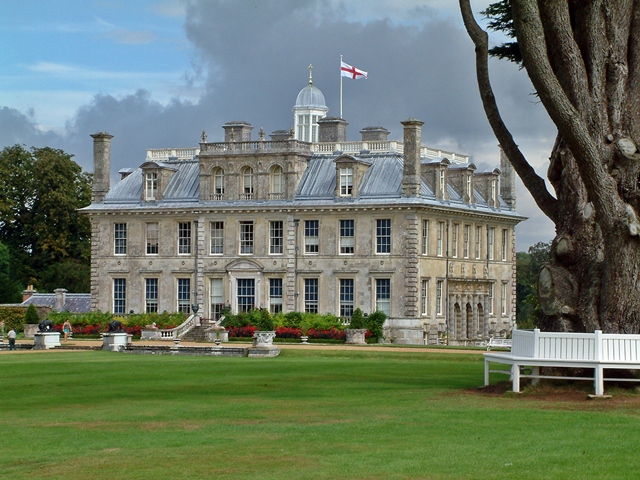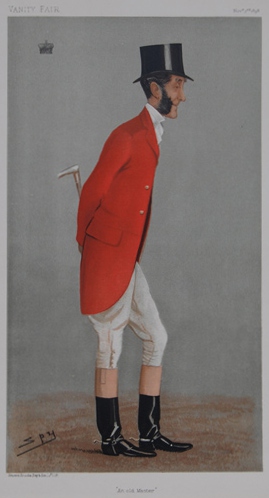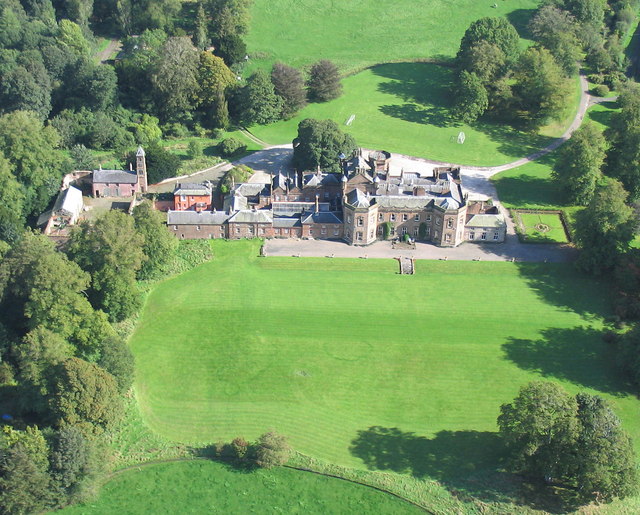|
Henry Sturt, 1st Baron Alington
Henry Gerard Sturt, 1st Baron Alington (16 May 1825 – 17 February 1904), was a British peer, Conservative Party politician, and notorious slum landlord in the East End of London. Early life He was the son of Henry Sturt, a landowner and politician from Dorset. He matriculated at Christ Church, Oxford in 1843. Political career He was elected to Parliament in 1847 for Dorchester, and re-elected in 1852. In 1856, one of the Conservative MPs for the county of Dorset died. Sturt resigned his Dorchester seat and was elected to the vacant Dorset seat in a by-election. He was re-elected in 1857, 1859, 1865, 1868, and 1874. On 15 January 1876, he was created Baron Alington, of Crichel, and thereafter sat in the House of Lords as a Conservative peer. Marriages and children Sturt was twice married. On 10 September 1853, he wed his first cousin, Lady Augusta Bingham, daughter of George Bingham, 3rd Earl of Lucan and Lady Anne Brudenell. They had three children: * Humphrey Napier ... [...More Info...] [...Related Items...] OR: [Wikipedia] [Google] [Baidu] |
The Right Honourable
''The Right Honourable'' ( abbreviation: ''Rt Hon.'' or variations) is an honorific style traditionally applied to certain persons and collective bodies in the United Kingdom, the former British Empire and the Commonwealth of Nations. The term is predominantly used today as a style associated with the holding of certain senior public offices in the United Kingdom, Canada, New Zealand, and to a lesser extent, Australia. ''Right'' in this context is an adverb meaning 'very' or 'fully'. Grammatically, ''The Right Honourable'' is an adjectival phrase which gives information about a person. As such, it is not considered correct to apply it in direct address, nor to use it on its own as a title in place of a name; but rather it is used in the third person along with a name or noun to be modified. ''Right'' may be abbreviated to ''Rt'', and ''Honourable'' to ''Hon.'', or both. ''The'' is sometimes dropped in written abbreviated form, but is always pronounced. Countries with common or ... [...More Info...] [...Related Items...] OR: [Wikipedia] [Google] [Baidu] |
House Of Lords
The House of Lords, also known as the House of Peers, is the Bicameralism, upper house of the Parliament of the United Kingdom. Membership is by Life peer, appointment, Hereditary peer, heredity or Lords Spiritual, official function. Like the House of Commons of the United Kingdom, House of Commons, it meets in the Palace of Westminster in London, England. The House of Lords scrutinises Bill (law), bills that have been approved by the House of Commons. It regularly reviews and amends bills from the Commons. While it is unable to prevent bills passing into law, except in certain limited circumstances, it can delay bills and force the Commons to reconsider their decisions. In this capacity, the House of Lords acts as a check on the more powerful House of Commons that is independent of the electoral process. While members of the Lords may also take on roles as government ministers, high-ranking officials such as cabinet ministers are usually drawn from the Commons. The House of Lo ... [...More Info...] [...Related Items...] OR: [Wikipedia] [Google] [Baidu] |
George Bankes
George Bankes (1788–1856) was the last of the Cursitor Barons of the Exchequer, the office being abolished by Conservative ministry of the Earl of Derby in 1852. Without any legal experience at the bar, he was the last barrister to be appointed to the post considered to be a medieval anachronism. Early life Bankes was the third son of Henry Bankes, MP of Kingston Hall, Dorsetshire, who represented Corfe Castle for nearly fifty years, and of Frances, daughter of William Woodley, governor of the Leeward Islands. Bankes was a lineal descendant of Sir John Bankes, Chief Justice of the Common Pleas in the reign of Charles I. He was educated at Westminster School and Trinity Hall, Cambridge. Career Bankes studied law first at Lincoln's Inn, and afterward at the Inner Temple, and was called to the bar by the latter society in 1815. In the following year, he entered Parliament as his father's colleague for the family borough of Corfe Castle, which he represented in every succeeding ... [...More Info...] [...Related Items...] OR: [Wikipedia] [Google] [Baidu] |
Henry Portman, 2nd Viscount Portman
Lord William Henry Berkeley Portman, 2nd Viscount Portman, GCVO (12 July 1829 – 16 October 1919) was a British Liberal Member of Parliament. Background Portman was the son of Edward Portman, 1st Viscount Portman and Lady Emma Lascelles, daughter of Henry Lascelles, 2nd Earl of Harewood. Political career Portman was elected to Parliament for Shaftesbury in 1852, a seat he held until 1857, and then represented Dorset from 1857 to 1885. In 1888 he succeeded his father and entered the House of Lords. Estates At the end of the nineteenth century the 99-year leases on the family properties in London came up for renewal, generating a colossal income for Lord Portman of some £100,000 a year. With this fortune he commissioned Norman Shaw to build a new mansion for him at the family seat in Bryanston, Dorset. Within 30 years, however, it had been sold to Bryanston School, which is still based there. This was because it rapidly became anachronistic and uneconomic even for an aristocr ... [...More Info...] [...Related Items...] OR: [Wikipedia] [Google] [Baidu] |
John Floyer (Dorset MP)
John Floyer (26 April 1811 – 4 July 1887) was an English cricketer with Amateur status in first-class cricket, amateur status who was active from 1832 to 1833. He was later a Conservative Party (UK), Conservative Party politician who sat in the House of Commons of the United Kingdom, House of Commons in two periods between 1846 and 1885. Life He was born in Stinsford, Dorset, the son of Rev. William Floyer and his wife Elizabeth Barton, daughter of Stephen Barton. He was a member of the old Floyer family of Floyer Hayes in Devon descended from ''Floherus'' (Flohère), the Exon Domesday Book tenant of that estate, a French knight who in 1086 held two estates in Devon. Floyer was educated at Winchester College. He matriculated in 1828 at Balliol College, Oxford, graduating B.A. in 1831. He appeared in first-class cricket for the Oxford University Cricket Club, University team in one match in 1832. He appeared in 1833 in one other match subsequently deemed to be first-class. H ... [...More Info...] [...Related Items...] OR: [Wikipedia] [Google] [Baidu] |
Henry Ker Seymer
Henry Ker Seymer (1807 – 28 May 1864) was a British Conservative politician. Seymer was first elected Conservative MP for Dorset, alongside John Floyer, at a by-election in 1846—caused by the resignations of Anthony Ashley-Cooper and Henry Sturt Henry Charles Sturt (; 9 August 1795 – 14 April 1866), of Crichel House, Dorset, was a British landowner and politician. Background Sturt was the son of Charles Sturt (1763–1812), who was the son of Humphrey Sturt and his wife Mary Pitfiel ...—and held the seat until his death in 1864. References External links * Conservative Party (UK) MPs for English constituencies UK MPs 1841–1847 UK MPs 1847–1852 UK MPs 1852–1857 UK MPs 1857–1859 UK MPs 1859–1865 1807 births 1864 deaths {{England-Conservative-UK-MP-1800s-stub ... [...More Info...] [...Related Items...] OR: [Wikipedia] [Google] [Baidu] |
Charles Napier Sturt (1832–1886)
Colonel Charles Napier Sturt (9 August 1832 – 13 March 1886) was an English soldier and politician. Sturt was born in London in 1832, the son of Henry Sturt of Dorset and Charlotte Penelope Brudenell, daughter of the Robert Brudenell, 6th Earl of Cardigan. In 1851 he joined the Grenadier Guards; in 1854 he served with 3rd Battalion in the Crimea War The Crimean War, , was fought from October 1853 to February 1856 between Russia and an ultimately victorious alliance of the Ottoman Empire, France, the United Kingdom and Piedmont-Sardinia. Geopolitical causes of the war included the de ..., where he was seriously wounded at the Battle of Inkerman. On returning from the war Sturt stood as Member of Parliament for Dorchester (UK Parliament constituency), Dorchester and was elected in a 1856 Dorchester by-election, by-election in July 1856. He was MP for Dorchester 1856 to 1874. He was a . Sturt died at Winchester Barrack on 13 March 1886, aged 54. References 1 ... [...More Info...] [...Related Items...] OR: [Wikipedia] [Google] [Baidu] |
Sir James Graham, 2nd Baronet
Sir James Robert George Graham, 2nd Baronet (1 June 1792 – 25 October 1861) was a British statesman, who notably served as Home Secretary and First Lord of the Admiralty. He was the eldest son of Sir James Graham, 1st Baronet, by Lady Catherine, eldest daughter of the 7th Earl of Galloway. In 1819, he married Fanny Callander, youngest daughter of Sir James Campbell of Craigforth and Ardkinglas Castle. Sir James was created Doctor of Laws at the University of Cambridge in 1835, was Lord Rector of the University of Glasgow, 1840. He was First Lord of the Admiralty from 1830 to 1834 when he resigned on account of the government pressing for a reform of the Irish Church. He became Secretary of the Home Department from September 1841 to July 1846 and again First Lord of the Admiralty from December 1852 until February 1855. He was a member of the Council of the Duchy of Lancaster, and Deputy Lieutenant for county of Hertfordshire. He represented Kingston upon Hull from 18 ... [...More Info...] [...Related Items...] OR: [Wikipedia] [Google] [Baidu] |
Henry Ashley (Dorchester MP)
Anthony Henry Ashley-Cooper (5 May 1807 – 2 December 1858) was an English politician and cricketer with amateur status. Early life Ashley was born at Wimborne St Giles in Dorset in 1807, a son of Cropley Ashley-Cooper, 6th Earl of Shaftesbury, and younger brother of Anthony Ashley-Cooper, 7th Earl of Shaftesbury, and of Anthony William Ashley. Career He was a member of parliament for Dorchester from 1831 to 1847. As a cricketer, he was associated with Marylebone Cricket Club (MCC) and made his first-class cricket debut in 1830. Death He died in 1858 at Clewer in Berkshire Berkshire ( ; in the 17th century sometimes spelt phonetically as Barkeshire; abbreviated Berks.) is a historic county in South East England. One of the home counties, Berkshire was recognised by Queen Elizabeth II as the Royal County of Berk .... References 1807 births 1858 deaths English cricketers English cricketers of 1826 to 1863 Marylebone Cricket Club cricketers Younger s ... [...More Info...] [...Related Items...] OR: [Wikipedia] [Google] [Baidu] |
Richard Brinsley Sheridan (politician)
Richard Brinsley Sheridan (bapt. 26 May 1806 – 2 May 1888) was an English Whig politician. Early life He was born in London, the eldest son of Thomas Sheridan, colonial treasurer in the Cape of Good Hope, and the novelist Caroline Henrietta Callander of Craig forth and the grandson of his namesake, the playwright Richard Brinsley Sheridan. His maternal grandfather was Sir James Campbell. After his father died in 1817, his mother moved to London with her seven children. Career He served as High Sheriff of Dorset in 1838. He was Member of Parliament (MP) for Shaftesbury from 1845 to 1852 and for Dorchester from 1852 until he retired in 1868 and also Deputy Lieutenant for Dorset. He was a Liberal in favour of extending the right to vote. Personal life He eloped with and subsequently married Marcia Maria Grant, the daughter of Gen. Sir John Colquhoun Grant on 18May 1835. Together, they were the parents of three daughters and six sons:''Burke's Landed Gentry'' (1886), sevent ... [...More Info...] [...Related Items...] OR: [Wikipedia] [Google] [Baidu] |
George Dawson-Damer
Colonel George Lionel Dawson-Damer CB PC (28 October 1788 – 14 April 1856) was a British Conservative Party politician. Background Dawson-Damer was a younger son of John Dawson, 1st Earl of Portarlington, and Lady Caroline, daughter of Prime Minister John Stuart, 3rd Earl of Bute. He assumed the additional name of Damer by royal sign-manual in 1829 on succeeding to a portion of the estates of his aunt, Lady Caroline Damer. Military career While on the staff of Sir Robert Wilson he was present with the Russian army at the retreat of the French cavalry from Moscow in October 1812. In 1813 he was at the battles of Lützen, Bautzen, Dresden, Kulm, Wurzen, and the Siege of Hamburg and the operation at Holstein. In 1815 he was appointed quartermaster general to the Prince of Orange, under whom he served in the 1st King's Dragoon Guards and was present at the battles at Quatre Bras and Waterloo, where he was wounded and had two horses shot under him and for which he was m ... [...More Info...] [...Related Items...] OR: [Wikipedia] [Google] [Baidu] |
Charles Booth (social Reformer)
Charles James Booth (30 March 1840 – 23 November 1916) was a British shipowner, social researcher, Comtean positivist, and reformer, best known for his innovative philanthropic studies on working-class life in London towards the end of the 19th century. During the 1860s Booth became interested in the philosophy of Auguste Comte, the founder of modern sociology, and converted to his Religion of Humanity, affiliated with members of the London Positivist Society, and wrote positivist prayers. He was captivated by Comte's idea that in the future, scientific industrialists would be in control of the social leadership instead of the church ministers. Booth's work, along with that of Benjamin Seebohm Rowntree, influenced government policy regarding poverty in the early 20th century and helped initiate Old Age pensions and free school meals for the poorest children. In addition, his investigation would also demonstrate how poverty was influenced by religion, education, and ad ... [...More Info...] [...Related Items...] OR: [Wikipedia] [Google] [Baidu] |
_(cropped).jpg)




